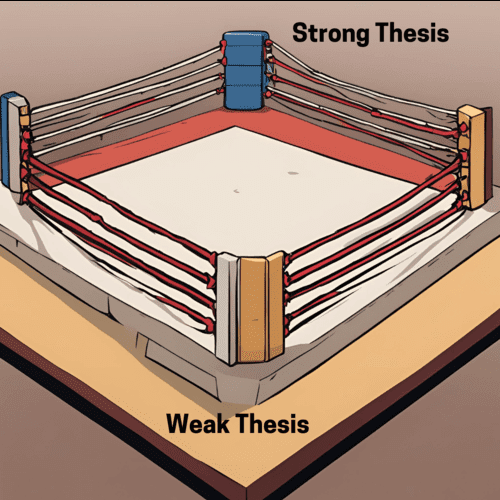
Introduction
Understanding the essence of a thesis statement is crucial for any academic or professional writer. It serves as the backbone of your entire paper, guiding your arguments and providing structure. Let's delve into what makes a thesis statement strong versus weak, and how you can craft a compelling one that resonates with your readers.
Characteristics of a Strong Thesis Statement
A strong thesis statement is like a beacon in your essay, guiding the reader forward. It is clear and specific, pinpointing exactly what the author intends to discuss. Moreover, it's arguable and provable, which means it presents a stance that can be debated or supported with evidence.
Examples of Strong Thesis Statements
For instance, in literature analysis, a strong thesis statement could be: "In George Orwell's 1984, the author uses symbolism to portray the dangers of totalitarianism." This statement is specific about the book and the literary device being analysed, and it presents an arguable point about the theme.
In scientific research, a strong thesis statement might assert: "The experiment demonstrates that XYZ method of protein extraction is more efficient than traditional methods." This statement is clear, specific, and presents a hypothesis that can be tested and proven through experimentation.
Characteristics of a Weak Thesis Statement
On the flip side, a weak thesis statement lacks clarity and specificity. It might be vague and general, such as "World War II was a significant event in history." While true, this statement doesn't offer any insight into the author's stance or the direction of the paper.
Alternatively, a weak thesis statement might be simply factual, like "I like dogs." While this statement expresses a personal opinion, it doesn't propose an argument or provide any reasoning behind the preference.
Examples of Weak Thesis Statements
Consider this weak thesis statement about a historical event: "The Civil Rights Movement happened in the 1960s." Although accurate, it doesn't delve into the significance or impact of the movement, making it too broad and factual.
In personal opinion essays, a weak thesis statement could be: "I believe exercise is good for health." While true, this statement lacks the specificity and arguability needed for an effective thesis.

How to Strengthen a Weak Thesis Statement
To strengthen a weak thesis statement, you can start by adding specificity. Instead of saying "The Civil Rights Movement happened in the 1960s," you could specify its impact on legislation or societal attitudes.
Additionally, make sure your thesis statement is arguable. This means that someone could potentially disagree with it or debate its validity. For instance, instead of "Exercise is good for health," a stronger thesis could be "Regular exercise decreases the risk of heart disease."
Revision Techniques
When revising your thesis statement, consider using qualifiers like "most," "some," or "many" to make your claims more nuanced. For example, "Many scholars argue that climate change is caused by human activity."
Narrowing down the scope of your thesis statement can also make it stronger. Instead of covering a broad topic like "education," focus on a specific aspect such as "The impact of technology on classroom learning."
Common Mistakes in Thesis Statements
One common mistake is being too broad. Avoid statements that try to cover everything without focusing on a specific angle or argument.
Conversely, being too narrow can limit the scope of your thesis statement. Ensure that your statement allows for enough exploration and discussion within your paper.
Tips for Crafting an Effective Thesis Statement
Crafting an effective thesis statement starts with brainstorming ideas. Consider different angles and perspectives on your topic before settling on a thesis.
Seeking feedback from peers or instructors can also help refine your thesis statement. They can offer insights and suggestions that you might not have considered.
Importance of Revising and Polishing
Remember, crafting a thesis statement is an iterative process. It's rare to nail it perfectly on the first try. Allow yourself the freedom to revise and polish your thesis statement as you clarify your ideas and arguments throughout the writing process.
Refining your thesis statement over time ensures that it accurately reflects the content of your paper and provides a clear roadmap for your readers.
Conclusion
In conclusion, a strong thesis statement is essential for crafting a coherent and focused paper. It sets the stage for your arguments and engages your readers from the outset. By ensuring your thesis statement is clear, specific, and arguable, you pave the way for a compelling academic or professional writing piece.
Crafting a strong thesis statement requires thought and effort, but the clarity and direction it provides to your paper are invaluable. Remember to revise and polish your thesis statement as needed, refining it to reflect the evolving content and focus of your work.
FAQs About Thesis Statements
- What is the difference between a thesis statement and a topic sentence?
-
- A thesis statement outlines the main point or argument of an entire paper, while a topic sentence introduces a single paragraph's main idea.
- Can a thesis statement change during the writing process?
-
- Yes, it's common for a thesis statement to evolve as you conduct research and refine your arguments.
- How long should a thesis statement be?
-
- A thesis statement is typically one to two sentences long, succinctly summarizing the main point of your paper.







Leave a Reply